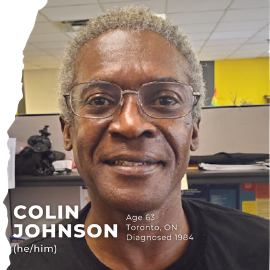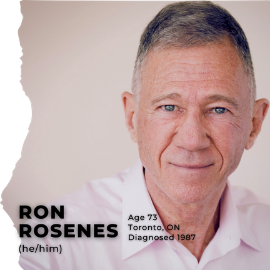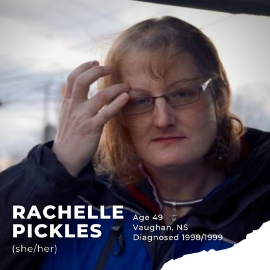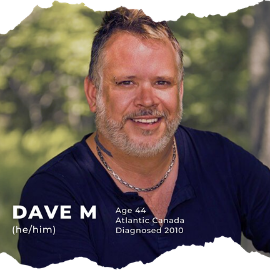Long-term HIV survivors thriving with spirit and compassion
June 5, 2021 marks the 40th anniversary since the start of the HIV/AIDS pandemic in 1981.
Annually, June 5th is recognized as HIV long-term survivors day. Today, HIV long-term survivors (LTS) represent a diverse group of people, which include those who were diagnosed with HIV before the advent of highly effective antiretroviral therapy (HAART) in 1996, those who were diagnosed after 1996, and those who were born with HIV or who acquired the virus as babies. LTS also include those who do not live with HIV, but were and continue to be the lovers and caretakers of those living with HIV.
In this month’s pozcast episode we celebrate and honour these long-term survivors by handing over the microphone and listening in on an intergenerational conversation with Adrian Betts, the Executive Director of the AIDS Committee of Durham Region, and Ashley Murphy, a 23-year-old actor and activist who has been living with HIV since birth (see Ashley's Ted Talk). With vastly different journeys, our two guests discuss their unique challenges, triumphs and lessons learned along the way.
A time of uncertainty
Tez Anderson, a renowned US HIV advocate and long-term survivor, wrote in his revised post, HIV Long-Term Survivors Declaration: A Vision for Our Future—AIDS at 40:
“It has been 40 years since AIDS arrived with a whisper. Unnamed and unwelcome on June 5, 1981. The Centers for Disease Control (CDC) reported on a cluster of five young gay men with ‘Pneumocystiscarinii pneumonia at three different hospitals in Los Angeles, California.’ They noted that two of the patients had died. It was a short article with big implications. It was the beginning of what would later be identified as the AIDS pandemic.”
It was the beginning of what would later be identified as the AIDS pandemic.
40 years ago, it was a time of uncertainty, when members of the gay community waded in the murky waters of the unknown—near-abandoned by a society that took far too long to acknowledge the HIV epidemic and to devote scientific and healthcare resources to its resolution due to widespread homophobia. HIV continues to affect marginalized groups globally, especially for those living at the intersections of these marginalized communities.

How HAART changed living with HIV
Since that time, the number of people living with HIV has grown to an estimated 62,050 people in Canada and 38 million people living with HIV/AIDS globally. The advent of HAART contributed greatly to what continues to be a growing life expectancy for people living with HIV/AIDS, and changed the fatal prospect of an HIV/AIDS diagnosis to that of a chronic but manageable condition.
After HAART, people were able to begin surviving—and in some cases thriving—with HIV. Over the course of the next 40 years, the term “long-term survivors” evolved to include many people with different experiences and identities.
Stories as survival for long-term survivors
In Tez's blog he also writes about why storytelling is important for survivors:
"We must write new, more accurate narratives that reflects the complexity of our history and the richness of our lives ones that honor our past, but does not weigh us down in it. Our histories are more than simply our histories because the stories we tell ourselves about our survival are an important part of the healing of our lives. Our stories hold the key to richer, fuller lives. Re-writing our stories are vital to our survival."
Our stories hold the key to richer, fuller lives. Re-writing our stories are vital to our survival.
And with that in mind, we are honoured to bring some of these compelling stories and experiences forward.

Colin shared:
38 years ago, I was told I was infected, a de facto death sentence! Those were “dark times” with all of the uncertainty, fear, hopelessness, loss, trauma, guilt, death and shame that came with an HIV diagnosis. It recalled biblical descriptions of how lepers were treated.
The last four decades have seen new medications: antiretroviral therapies, PrEP and PEP—making it possible for people living with HIV to live long productive lives, while reducing the chance of passing on HIV to others.
Death is now off the table, but other co-morbidities are in my future. Therefore, we must look at HIV through a holistic lens, incorporating harm reduction and mental health as part of treatment. Fortunately, I have been supported though all of this by a loving sister, my medical team (whom I have informed that I am cloning), ASOs and friends. Additional funding and research are necessary to respond to and support an aging HIV-positive population.
For those newly diagnosed, you are not alone. Stigma still exists but you are now part of a large worldwide community that will take you on a new and fabulous journey.


Ron shared:
My diagnosis in 1987 came as no surprise to me. My partner Kimble was diagnosed in a pilot antibody test in 1983 and our doctor had noticed “anomalies” in our blood work in the early 80s. We had both been sexually active in the late 70s on visits to New York but adopted condom use as soon as Michael Callen’s tract appeared on “How to Have Sex in an Epidemic.” Kimble did not live long enough to benefit from triple therapy in 1997. I was devastated by the loss of my beloved Kim, but I somehow managed to hang on and graduated from monotherapy with AZT to dual, and then finally to an effective triple drug regimen.
I quit my high pressure sales job in 1991 and volunteered at the AIDS Committee of Toronto, where I eventually became Board Chair in the mid-90s. It was a time of change and as a gay man I believed that the organization ought to share its services with the growing number of women who were being impacted by HIV/AIDS. HIV doesn’t discriminate, and yet over the years, it has certainly found its way into the bodies of some of our most vulnerable people.
Now that treatment has become easier to take, a lot of our work today is focused—as it should be—on the reduction of stigma and other barriers that prevent people, often from Indigenous and racialized communities, from accessing health care. If there is one key to my ability to thrive as I age with HIV, it’s the work I continue to do in the sector every day. Whether that includes advocating for access to health care, working as a community-based researcher, or serving as Chair for the HIV Legal Network, I have never stopped learning and growing. I have always been up for new challenges: from being a survivor of HIV, to a witness and finally as a pioneer.


Rachelle shared:
The message I would like to pass on to the newly diagnosed is to plan for retirement—I only wish I had started sooner! HIV is not a death sentence, and you can have a long and healthy life ahead of you.
The key to living with HIV is quite simple: you are not the disease. Do not let it define you. It’s very easy to let it define you, as your doctors and nurses will do that for you. What I will tell you is that there is life after diagnosis. I thought I would be dead by now or living out on the street eating out of garbage cans. Yes, I thought that would be my life.
Someone saw the good in me and gave me a hand up, not a hand out. I worked hard to get to where I am today and will continue to do so for myself and for the community that has accepted me for one of their own.


Dave shared:
Living well with HIV requires work. Being a long-term survivor means so much more than just living with HIV. It means surviving and working on all of the other things that come along with a diagnosis, like one’s mental health, physical health, spiritual health, and also includes addressing issues around disclosure, aging and living with other co-morbidities. Most significant of all, is having to endure the stigma and discrimination that comes with an HIV diagnosis.
It took me many years to realize that when stigma stares me in the eye, it’s not personal. The stigma is toward my HIV. After all, I'm a pretty great guy, I just happen to be living with HIV.
It is important to me to share my story and dispel the misinformation about HIV. I also want to encourage others—newly diagnosed with HIV or living with HIV long-term—to always remember to be kind to your mind, body and Spirit. Connect with others living with HIV. You’re not alone!
HIV LTS Day 2021: “AIDS at 40: What Now?”
After reading this, you may be thinking to yourself, “What now?” There is a growing grassroots movement in the United States created by and for HIV long-term survivors, called Let’s Kick ASS (AIDS Survivor Syndrome), that is proposing a powerful call to action—an invitation—to survivors to share their insights from surviving HIV/AIDS over the last 40 years.
Their theme for this year’s HIV Long-Term Survivors Day (HLTSD), “AIDS at 40: What Now?” is an opportunity to raise the collective voices of LTS and advocate for the supports needed by this aging population. If you’d like to contribute your voice to their movement or to The Positive Effect, you can submit your story here.
More about aging with HIV
For some long-term survivors, aging with HIV was not a reality to consider, much less a thing to prepare for. There are now over 50% of Canadians living with HIV that are over the age of 50. Just as we saw a paradigm shift in the early to mid-90s with treatment, we now need to shift our attention to the experiences and challenges faced by long-term survivors of HIV—those who may now be entering a new stage of life that requires its own unique response and supports.
And while we have shone a light on the strengths and resilience of individuals and communities in this blog, that doesn’t mean that people aging with HIV aren’t still faced with unmet challenges. These include a number of interconnected psychosocial and physical health issues shaped by larger structural factors, such as HIV stigma, ageism and economic insecurity.
There is some promising research happening in Canada around these topics that we hope to explore and bring to you in future blog posts, but until then we encourage you to check out:
- the PANACHE (Preferences and Needs for Aging Care among HIV Elders in Ontario) study,
co-led by Kate Murzin at Realize and Dr. Sharon Walmsley in collaboration with a large and very
active community-based research team; - the THRIVE study in BC;
- a powerful film titled, AGING & HIV: A Story of Resiliency; and
- a private, moderated Facebook group page for long-term survivors of HIV.










